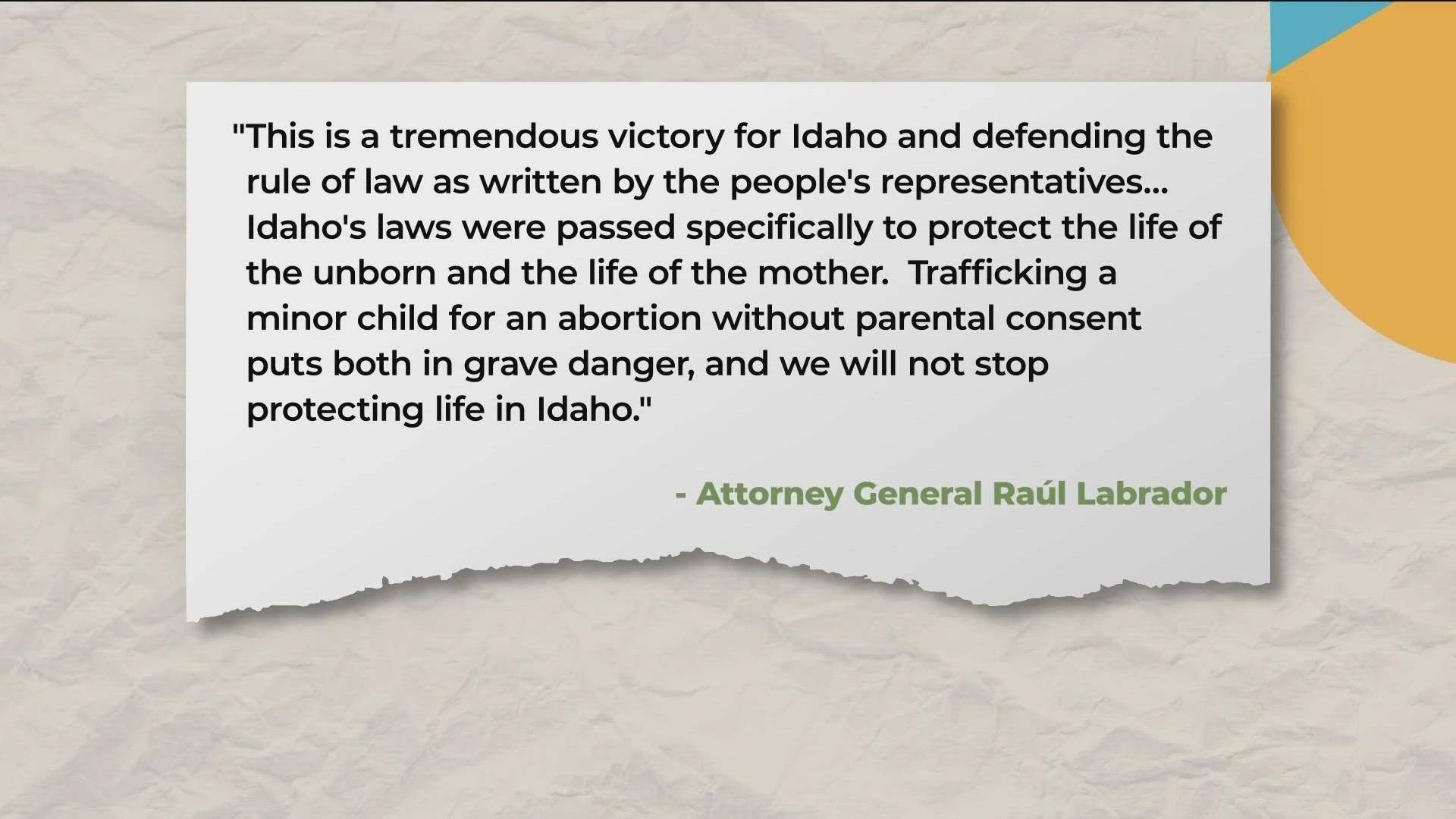BOISE, Idaho — This story originally appeared in the Idaho Press.
A panel of judges on the Ninth Circuit Court of Appeals will allow most of Idaho’s “abortion trafficking” law to go into effect, as a court challenge against it continues.
The law prohibits taking a minor under 18 across state lines to obtain an abortion without parental consent, and is the first of its kind to ban obtaining an abortion in a state where it is legal.
Idaho's abortion ban makes it a felony to provide an abortion in the state except under very narrow circumstances. The procedure is legal in neighboring states, such as Washington and Oregon, where adults may go for the procedure.
Advocacy groups and a lawyer who represents sexual assault victims challenged the constitutionality of the law in 2023, and a district court judge later put in place an injunction, blocking it from going into effect.
In a decision entered Monday, Circuit Court Judge Margaret McKeown wrote the majority opinion overturning the district court decision in part, and returning it to the lower court. The panel kept in place a block on the part of the law that prohibits “recruiting” minors for the purpose of getting an abortion, ruling that the over-broad definition of recruiting would likely violate First Amendment-protected speech.
“Encouragement, counseling, and emotional support are plainly protected speech under Supreme Court precedent, including when offered in the difficult context of deciding whether to have an abortion,” McKeown wrote.
The ruling departed from the district court opinion, and ruled the “recruiting” aspect of the law could be severed — meaning the rest of it could go into effect and only the recruiting aspect could not be prosecuted while the injunction is in place.
“This is a tremendous victory for Idaho and defending the rule of law as written by the people’s representatives,” Idaho Attorney General Raúl Labrador said in a press release. “Idaho’s laws were passed specifically to protect the life of the unborn and the life of the mother. Trafficking a minor child for an abortion without parental consent puts both in grave danger, and we will not stop protecting life in Idaho.”
“While the judge’s ruling to strike down language around ‘recruiting’ within this ban is positive, this decision is not good for Idaho,” Planned Parenthood Alliance Advocates Idaho Director Mistie DelliCarpini-Tolman said in an emailed statement. “We need to call this ban what it is — a minor travel ban made possible by gross government overreach and invasion of privacy that goes against our American democratic principles. AG Labrador’s claim that this ban ‘protects mothers’ is pure hypocrisy and couldn’t be further from the truth: this bill hurts the very people it aims to protect, the young people of Idaho."
The court ruled that the plaintiffs — attorney Lourdes Matsumoto, Northwest Abortion Access Fund, and Indigenous Idaho Alliance — did have proper standing and that Labrador was an appropriate defendant, despite the argument that he is not the primary enforcer of the Idaho law.
Another judge on the panel, Judge Carlos Bea, wrote a partial concurrence, partial dissent from the majority opinion — he argued the plaintiffs lacked standing to sue Labrador because, Bea argued, the attorney general would not be the primary enforcer of the law, and county prosecutors would be the ones to bring the charges.
The majority opinion concluded that the aspects of the law that prohibit “harboring” or “transporting” would likely be found constitutional.
However, with no clear definition of what “recruiting” would entail, the panel thought the plaintiffs would likely succeed in arguing that section violated the First Amendment. The panel also said that, because of the way the law was written, it may also prohibit counseling on the few avenues for legal abortions in-state.
“Worryingly, the ‘recruiting’ provision encompasses an adult’s encouragement of a minor not only to obtain a legal abortion out-of-state, but also to obtain a legal abortion in Idaho under one of the few exceptions to the state’s near total abortion ban, such as pregnancy resulting from an act of rape or incest that was previously reported to law enforcement,” the judge wrote. “That is, an adult concerned for the wellbeing of an underage victim of incest would be prohibited from counseling and then assisting that victim in obtaining an abortion without informing a parent—who may well be the perpetrator.”
The opinion also called into question the use of the word “trafficking” in the naming of the statute, because the law differs from traditional laws banning trafficking. Human trafficking laws typically ban coercive conduct to facilitate illegal activities, the judge wrote, yet Idaho’s abortion trafficking law also bans conduct that the minor consents to, for a legal procedure.
“Calling the statute 'abortion trafficking' does not make it so,” the judge wrote.
The court disagreed with the district court decision that the entire law was “unconstitutionally vague.” The panel determined that the law, “despite its awkward construction, does not fall afoul of the vagueness line.” The court also disagreed with other First Amendment claims regarding aspects of the law outside of the “recruiting” prong.
The Idaho Legislature passed HB 242 in 2023, making it a felony crime punishable by up to five years in prison to help a minor travel across state lines to obtain an abortion.
The bill sponsor, Rep. Barbara Ehardt, R-Idaho Falls, argued it was a parental rights bill. Advocates expressed deep concerns about it lacking an exception for children in abusive families who may not feel safe disclosing their pregnancy or decision to obtain an abortion, the Idaho Press previously reported.
The case goes back to the district court to revise its injunction to be consistent with the Ninth Circuit decision.
For more stories from the Idaho Press, click here.

